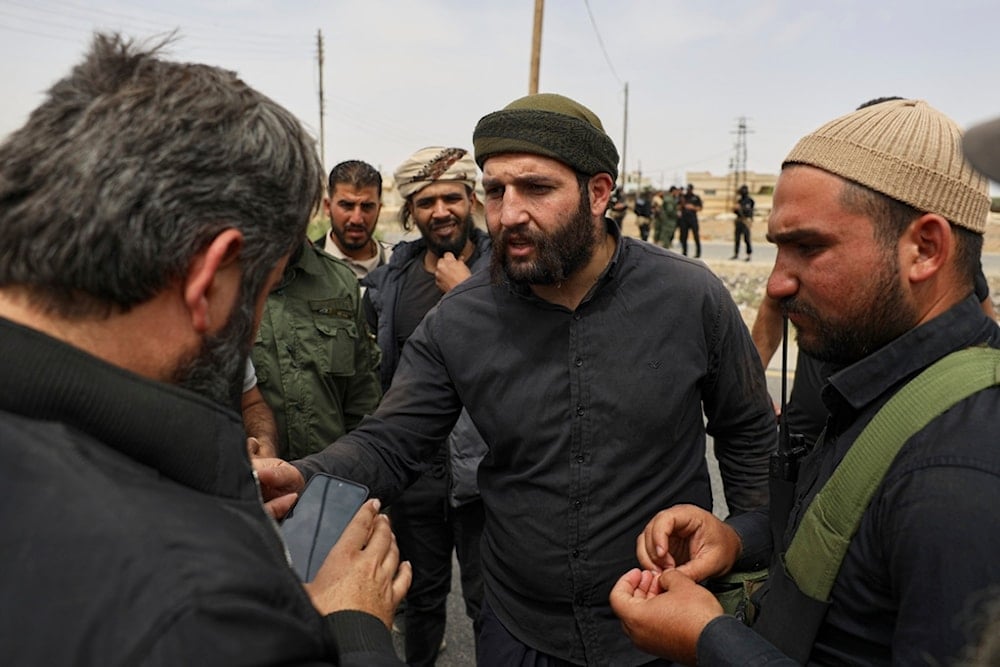Sweida residents demand state intervention, control over province
Sweida residents and Druze leaders call for calm, urge state intervention, and warn of rising chaos as violence with Bedouin tribes leaves 89 dead.
-

Sheikh Laith al-Balous, centre, a Druze leader in the southern Sweida province, speaks with Sweida governor Mustafa al-Bakour, left, at al-Sor al-Kobra village, southern Syria, Thursday, May 1, 2025. (AP)
Prominent figures, intellectuals, and residents of Sweida province appealed Monday for calm and accountability, urging an immediate end to the spiraling violence that has gripped the region. The signatories stressed their “moral and national responsibility” to prevent further descent into chaos and self-destruction.
Expressing deep concern over the spread of unchecked violence and weapons among various groups, the statement called for a collective moral reckoning. Residents urged all sides to prioritize wisdom over impulsiveness and to return to the framework of the state and the rule of law.
The residents emphasized that the alternative to the authority of the state is lawlessness. They voiced their preference for civil peace and public safety over the presence of unregulated armed groups or unlawful behavior, insisting on safeguarding the city’s social fabric and preventing its neighborhoods from becoming battlefields. “The blood of our sons is more precious than any conflict,” the statement read.
Direct appeal to Damascus
They also called for maintaining the security and unity of the community and protecting the city's neighborhoods from becoming arenas of internal warfare.
The residents of Sweida directed a firm appeal to the Syrian state, urging it to fulfill its constitutional and legal responsibilities in protecting civilians and property. They demanded serious efforts to de-escalate tensions, hold those responsible for destabilization accountable, and restore full state control through support for both civil and security institutions.
The statement encouraged open communication channels between state institutions and the province’s intellectual and social elite, describing them as essential partners in building civil peace and spreading awareness during this critical time.
The statement also stressed the urgency of securing the main road between Damascus and Sweida, describing it as a critical economic, social, and educational lifeline. Its stability, the residents warned, is vital to daily life and must be treated as a top priority.
They concluded their message as a sincere and urgent call to end the bloodshed, urging a return to reason, and taking national responsibility with clarity and transparency.
Spiritual leadership renews call for ceasefire
Separately, the Spiritual Leadership of the Druze Community reiterated its demand for an immediate ceasefire and de-escalation, stating that it has “never sought bloodshed.” The leadership renewed its appeal to end violence, safeguard villages and livelihoods, and emphasized that “the hands of reconciliation remain extended to heal the wounds.”
The religious authority strongly rejected the presence of unlawful or extremist factions, reaffirming its commitment to the rule of law, state sovereignty, and peaceful, diplomatic solutions that preserve rights and dignity.
It also confirmed its openness to organizing and securing the province through its own honorable local police and administrative structures, a vision it said aligns with the position of the “interim government in Damascus,” with whom coordination remains intact.
Clashes escalate in Sweida
Fierce clashes broke out overnight Monday in southern Syria, leaving at least 89 people dead and at least 100 injured. According to local sources who spoke to Al Mayadeen, violent confrontations erupted between armed Druze factions from Sweida and Bedouin tribal groups near al-Thalaa military airport and the village bridge of Hazm, located north of Sweida governorate.
Moreover, sources also told Al Mayadeen that armed groups took control of the village of al-Surah in Sweida’s countryside following intense clashes, triggering a wave of displacement from the area.
Meanwhile, local factions regained control of the village of al-Tayra in western Sweida, as residents in the Khalkhalah area began fleeing toward the city amid fears of escalating battles.

 4 Min Read
4 Min Read










